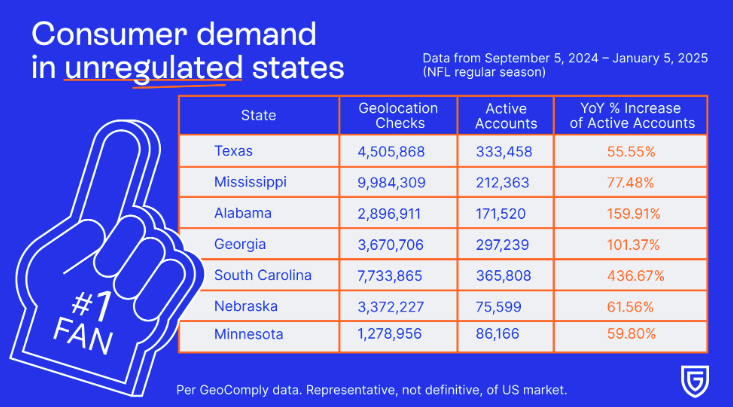- GeoComply released sports betting data for several key states debating sports betting legislation
- The company processed geolocation checks for seven unregulated states and found sports betting interest is increasing each year
- Several of these states will debate sports betting bills for their 2025 legislative sessions
Seven states likely to consider sports betting legalization during their 2025 legislative sessions already have high interest from residents in the new form of gaming, according to data from geolocation company GeoComply.
GeoComply released data for seven unregulated states — Texas, Nebraska, Alabama, Georgia, Minnesota, South Carolina, and Mississippi — which shows state residents are already attempting to access legalized sports betting platforms at high rates.
All seven of these states have shared an interest in at least discussing legalized sports betting in the upcoming year.
Sports Betting Interest Continues to Grow in Unregulated State
Each of the seven states, according to GeoComply data, have shown year-over-year increases in active sports betting accounts.
According to data collected during the NFL season from Sept. 5, 2024, through Jan. 5, 2025, Texas, Georgia, Mississippi, Alabama, and South Carolina currently have hundreds of thousands of active sports betting accounts.
Alabama, Georgia, and South Carolina all experienced more than a 100% increase in year-over-year active accounts, with South Carolina reporting a whopping 436% increase in active accounts. The interest in South Carolina sports betting is likely linked to neighboring North Carolina launching its own sports betting market in March 2024.
“This data underscores the substantial unmet demand for legal sports betting in these states. The remarkable year-over-year increase in active accounts from South Carolina is directly linked to North Carolina’s launch of statewide mobile sports betting in 2024. This data point alone provides clear evidence of how legalized sports betting in one state can influence consumer behavior in neighboring states. South Carolina residents are signaling a strong desire for the same legal options their northern neighbors enjoy,” GeoComply reported.
South Carolina lawmakers have already filed a sports betting bill ahead of the state’s session.

Key Findings in GeoComply Data
The company also reported the number of geolocation checks during the NFL season through the reviewed four-month period. GeoComply’s technology enables the company to identify potential bettors in unregulated states attempting to access legal sportsbooks and block their efforts to prevent wagers.
Mississippi led the way in these checks with nearly 10 million. Mississippi lawmakers attempted to push through an online sports betting bill during the 2024 legislative session, but a House-approved bill could not gain the necessary support in the Senate and eventually failed.
GeoComply noted the following geolocation checks for the seven states:
- Mississippi: 9,984,309
- South Carolina: 7,733,865
- Texas: 4,505,868
- Georgia: 3,670,706
- Nebraska: 3,372,227
- Alabama: 2,896,911
- Minnesota: 1,278,956
Minnesota kicked off its session this week and will likely see several introduced sports betting bills over the next few months. Legalization efforts came close in 2024, with discussions that continued into the final day of the session.
An eventual sports betting deal was brokered between state tribes, racetracks, and charity groups, the first of its king in the state and a major hurdle to overcome, but lawmakers could not usher the bill across the finish line.
Sports betting has become increasingly popular in recent years, with more and more states legalizing and regulating the industry. However, there are still a number of states where sports betting remains unregulated, leading to a high level of interest in the activity.
One of the main reasons for the high interest in sports betting in unregulated states is the potential for large payouts. Without regulations in place, bettors have the opportunity to place bets on a wide range of sporting events with potentially higher odds and payouts. This can be particularly appealing to those looking to make a quick profit or those who enjoy the thrill of high-risk betting.
Another factor driving interest in sports betting in unregulated states is the convenience and accessibility of online betting platforms. With the rise of online sportsbooks, bettors can easily place bets from the comfort of their own homes or on the go using their mobile devices. This ease of access has made sports betting more appealing to a wider audience, including casual bettors who may not have previously considered participating in the activity.
Additionally, the lack of regulation in unregulated states can also lead to a sense of freedom and autonomy for bettors. Without strict guidelines and restrictions in place, bettors have more flexibility in terms of the types of bets they can place and the amount of money they can wager. This can be attractive to those who prefer to have more control over their betting experience.
However, it’s important to note that the lack of regulation in unregulated states can also pose risks for bettors. Without oversight from regulatory bodies, there is a higher potential for fraud, scams, and other unethical practices within the industry. Bettors in unregulated states should exercise caution and do their due diligence when choosing an online sportsbook to ensure they are engaging with a reputable and trustworthy provider.
Overall, the high interest in sports betting in unregulated states is driven by a combination of factors, including the potential for large payouts, convenience of online platforms, and sense of autonomy for bettors. While there are benefits to participating in sports betting in unregulated states, bettors should be aware of the risks and take steps to protect themselves while engaging in this popular activity.
